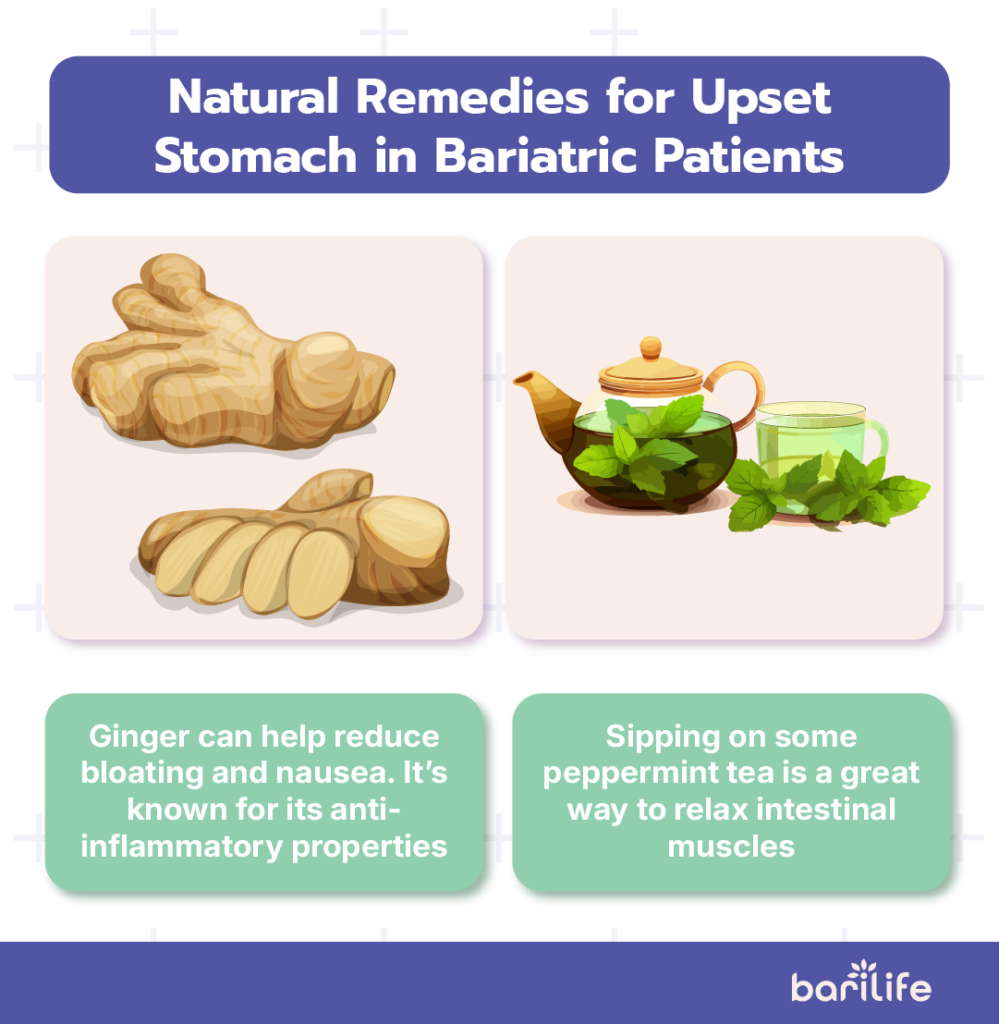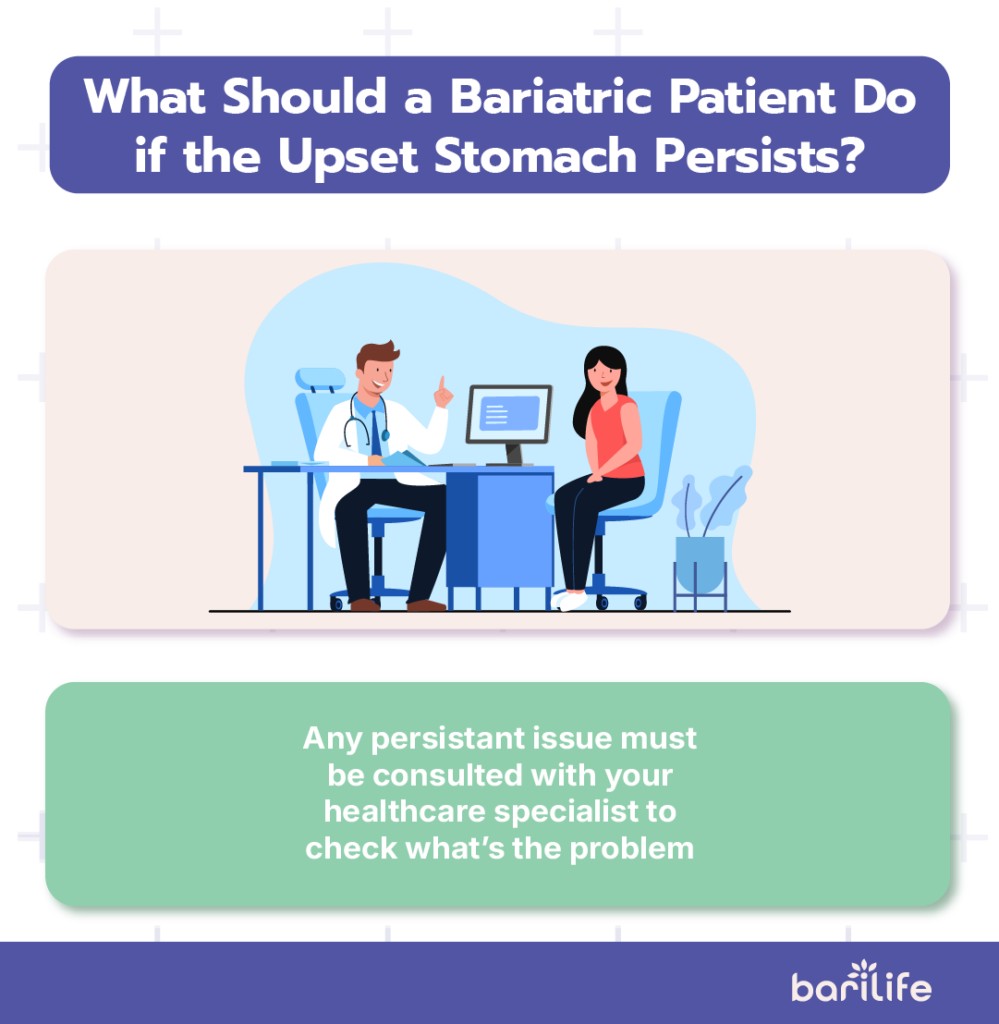After bariatric surgery, uncomfortable gastrointestinal side effects are common, at least in the initial recovery phase. During this time, your body is adjusting to its new layout.
Your digestive system has been significantly changed. These changes affect the way your body digests and absorbs nutrients. For many bariatric patients, experiencing an upset stomach is common.
This article will cover a few things. First, we'll look at the common causes of upset stomach in bariatric patients. Then, we'll review some safe, over-the-counter medicines and natural remedies. Next, we'll discuss probiotics and their role in digestive health. Finally, we'll share what to do if upset stomach pain persists.
Common Causes of Upset Stomach in Bariatric Patients

There are a few common causes of upset stomach in bariatric patients. One is dumping syndrome. In this condition, food moves too rapidly from the stomach into the small intestine. This typically happens with high sugar foods. This results in symptoms like nausea, abdominal cramps, and diarrhea.
It’s also possible that an upset stomach could result from consuming too much food at once. Remember, because your stomach has likely been altered in size, you cannot eat like you used to. Eating large portions can cause stomach pain due to the reduced stomach size.
You may also find you have food intolerances. After bariatric surgery, some may develop a sensitivity to certain foods. This could cause discomfort and indigestion after eating those foods.
Lastly, an upset stomach could be due to GERD. This condition causes stomach acid to build up and spill into the esophagus. It results in a burning sensation in the chest. GERD is common after bariatric procedures, especially the sleeve gastrectomy. It causes heartburn, acid reflux, and an upset stomach.
Additionally, patients should be cautious with certain medications. For example, NSAIDs after bariatric surgery may not be recommended due to the increased risk of ulcers. Always consult your doctor before taking any new medication to ensure it is safe for your altered digestive system.
Safe Over-the-Counter Medications
You may want to consider safe over-the-counter medications to relieve an upset stomach. Medications that contain calcium carbonate, like Tums or other antacids, can neutralize stomach acid.
This can relieve heartburn or upset stomach. Additionally, simethicone, found in products like Gas-X helps to alleviate any gas pain and bloating that may occur. Lastly, bismuth subsalicylate, the active ingredient in Pepto-Bismol, can relieve indigestion and nausea.
However, reach out to a healthcare provider before use because of its potential side effects. It’s always a good idea to contact your doctor when thinking about taking new medications or supplements such as bariatric vitamins or a bariatric multivitamin with iron.
Natural Remedies for Upset Stomach in Bariatric Patients
Wanting to go the natural route? There are some natural remedies for an upset stomach as well. Ginger can help reduce bloating and nausea. It’s known for its anti-inflammatory properties. Try adding in some ground ginger to curries or baked goods or even grating fresh ginger into smoothies.

Sipping on some peppermint tea is a great way to relax intestinal muscles. This may help to alleviate digestive issues like nausea and an upset stomach.
You may even want to seek out licorice root, which has been used traditionally to soothe stomach discomfort. However, these remedies are not widely studied in bariatric patients.
Always reach out to your surgeon before taking any supplements or introducing any natural remedies to your routine.
Probiotics and Digestive Health
Probiotics are all the rage and rightly so. They can help maintain a healthy balance of bacteria in your gut, or microbiome. Having a healthy balance of bacteria can help to reduce gastrointestinal symptoms like nausea or an upset stomach. Additionally, probiotics may help to improve the absorption of certain nutrients.
This is crucial after bariatric surgery as your altered digestive system limits absorption. Lastly, probiotics may even be helpful for immune support. They can strengthen the gut barrier, aiding in overall immune function. Again, like previously discussed, be sure to reach out to your healthcare provider before taking a new medication or supplement, like bariatric probiotic.
What Should a Bariatric Patient Do if the Upset Stomach Persists?
Lastly, diagnostic testing may be needed. Your doctor may do an endoscopy to find the cause of your symptoms. If you have any questions or concerns about your symptoms, always reach out to your doctor.
After bariatric surgery, it can be overwhelming to manage an upset stomach. But, you're not alone. Many patients feel stomach upset as their bodies adjust to changes in their digestive systems.
You can manage your symptoms and aid your recovery. To do this, know the common causes. Then, explore safe remedies. Finally, seek advice from healthcare providers.
You can find relief and regain control of your digestive health in many ways. Try mindful eating, natural remedies like ginger or probiotics, or a dietitian to find trigger foods.

If your symptoms persist, please contact your surgeon or healthcare team. They will evaluate you. Persistent pain could signal serious issues, like ulcers or strictures. They need urgent care.
Your journey to better health is a partnership with your medical team. Prompt action can prevent complications and ensure a smoother recovery. With the right tools, support, and mindset, you can overcome the challenges of post-bariatric life. You can keep working toward your health and wellness goals.
Conclusion
Managing an upset stomach after bariatric surgery is common but manageable with the right approach. Safe remedies include antacids, simethicone, ginger, probiotics, and tailored options like Bari Life Supplements.
Always consult your healthcare provider before trying new solutions. Persistent symptoms may signal complications requiring prompt medical attention. With the right support, you can overcome discomfort and stay on track toward your wellness goals.

Leave a Comment
Your email address will not be published.